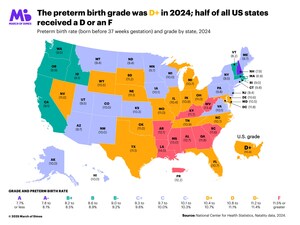
WASHINGTON, Nov. 17, 2025 /PRNewswire/ -- March of Dimes, leader in the fight for the health of all moms and babies, today released its 2025 Report Card, revealing that the District of Columbia earned an F for its preterm birth rate of 11.8%, ranking 45th out of 52 (all states, D.C., and Puerto Rico). The annual Report Card, released on World Prematurity Day, measures the state of maternal and infant health in the US by evaluating preterm birth rates, access to maternity care, and other key indicators of well-being.
The District experienced a 9% increase in its preterm birth rate from the previous year — the largest increase of any state or territory — marking a statistically significant rise in poor birth outcomes. Babies born to Black moms face a preterm birth rate of 14.5%, compared to 7.0% for White moms. The infant mortality rate also rose to 7.0 deaths per 1,000 live births, and nearly one in four babies (23.0%) are born to moms receiving inadequate prenatal care.
Across the region, the Report Card revealed mixed progress: Maryland earned a D+ with a preterm birth rate of 10.5%, while Virginia received a C- at 10.1%. The findings underscore that despite modest improvements in parts of the DMV area, the overall maternal and infant health crisis persists, and racial disparities remain a significant challenge.
Nationally, the United States continues to face a maternal and infant health crisis:
- Preterm birth: The US earned a D+, marking the fourth consecutive year at its historically lowest grade for a preterm birth rate of 10.4%.
- Medicaid disparity: Babies born to Medicaid-insured moms face a preterm birth rate of 11.7%, compared to 9.6% for privately insured.
- Racial disparities worsening: Preterm birth rates among babies born to Black moms climbed to 14.7% — now 1.5 times higher than for other babies.
"As a clinician who has seen how much is possible when we get it right, the data is deeply frustrating," said Dr. Michael Warren, Chief Medical and Health Officer at March of Dimes. "We have known about risk factors for preterm birth — including a history of prior preterm birth, chronic disease, and unequal access to care — for years. That the national rate remains unchanged while disparities continue to widen means we must deepen our commitment to research, expand maternity care access, and push for better policies that protect our nation's moms and babies."
March of Dimes is addressing these drivers of poor outcomes across the region. In the D.C. metro area, the organization operates Mom & Baby Mobile Health Centers® that bring prenatal and postpartum care directly to neighborhoods where maternity care is limited. March of Dimes also supports families through NICU Family Support® programs in local hospitals, helping parents navigate the emotional and physical challenges of preterm birth and extended neonatal care. Additionally, March of Dimes hosts the DMV Maternal and Infant Health Equity Coalition, partnering with experts across DC, Maryland, and Virginia to advance patient-centered care, supporting the maternal workforce, and state policies aimed at improving outcomes for families.
"Behind every statistic is a mom, a baby, and a family that deserves their best chance at a healthy start," said Dr. Elizabeth Kielb, Director of Maternal and Infant Health at March of Dimes. "In our area, we're focused on meeting families where they are whether that's in a hospital NICU or on our Mama & Baby Bus in their community, to make sure that every family has the opportunity for a strong start."
While the District continues to face steep challenges, March of Dimes' work in the surrounding region reflects progress and partnership. In Maryland, the preterm birth rate improved slightly, supported by expanded access to prenatal care. In Virginia, outcomes have improved for severe maternal morbidity and early access to care, bolstered in part by March of Dimes' leadership on the recent Virginia Momnibus, a comprehensive package that secured critical investments in mobile health, midwifery, and maternal health infrastructure. Together, these states illustrate that targeted interventions, from community-based mobile health programs to hospital-level family support, can create meaningful change for moms and babies.
At the national level, March of Dimes continues to advocate for policies that strengthen the maternal health infrastructure, including the Preventing Maternal Deaths Act to sustain funding for Maternal Mortality Review Committees, reauthorization of the PREEMIE Act to renew federal investment in research and data, and expanded Medicaid postpartum coverage to ensure continued care for moms beyond birth.
While the 2025 Report Card confirms that the United States remains stalled in a dangerous status quo, March of Dimes is advancing research, expanding access to care, and advocating for policies that protect the health of every mom and baby.
The full 2025 Report Card, including state-by-state grades and recommendations, is available at marchofdimes.org/reportcard.
About March of Dimes
March of Dimes leads the fight for the health of all moms and babies. We support research, education, and advocacy, and provide programs and services so that every family can get the best possible start. Since 1938, we've built a successful legacy to support every pregnant person and every family. Visit marchofdimes.org or nacersano.org for more information.
SOURCE March of Dimes Inc.








Share this article